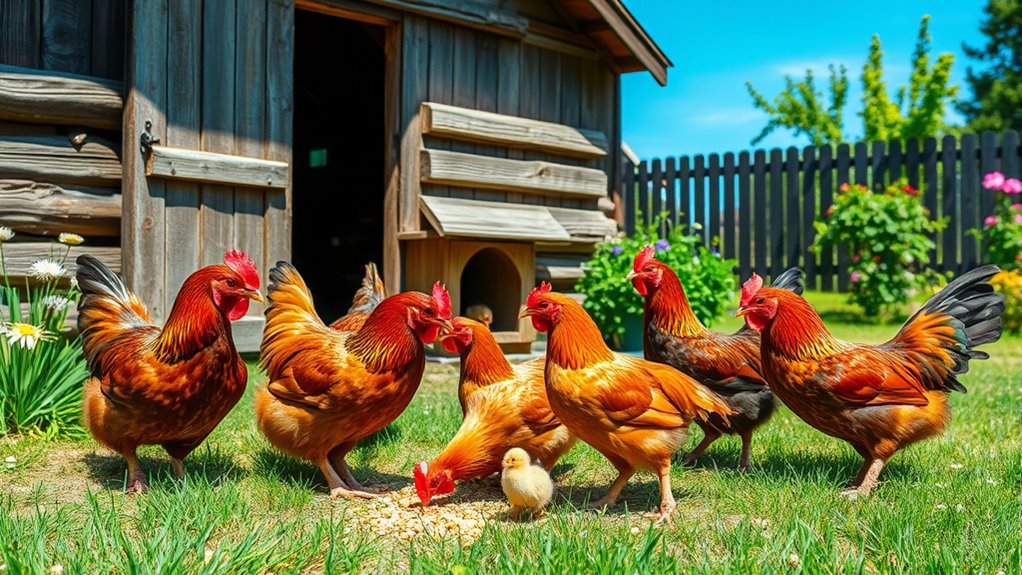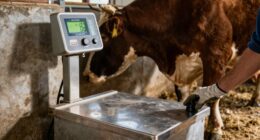Starting with backyard chickens is easy when you understand the basics. Keep your coop well-ventilated, predator-proof, and spacious—about 4 sq ft per bird inside and 10 sq ft outdoors. Maintain proper temperature, humidity, and regularly turn eggs during incubation if hatching. Provide fresh water, balanced feed, and clean living spaces to keep your flock healthy. With the right setup and care, you’ll enjoy fresh eggs and happy chickens—more tips await to help you succeed.
Key Takeaways
- Maintain proper incubation conditions: 99.5°F temperature, 50-55% humidity, and regular egg turning.
- Design a secure coop with adequate space, ventilation, predator-proofing, and easy access for cleaning.
- Provide nesting boxes with clean bedding for hens to lay eggs comfortably.
- Ensure fresh water, balanced feed, and a clean environment to promote healthy flock growth.
- Regularly inspect and maintain the coop to prevent predators and ensure a safe, healthy environment.

Raising chickens in your backyard can be a rewarding experience, providing fresh eggs and a sense of connection to your food. To get started, you’ll need to understand the basics of egg incubation and coop design. Properly managing egg incubation is essential if you plan to hatch chicks yourself. It involves maintaining a consistent temperature of around 99.5°F (37.5°C) and humidity levels between 50-55%. Using an incubator can make this process easier and more reliable, especially for beginners. Remember, turning the eggs regularly—at least three times a day—helps develop healthy chicks. As you gain confidence, you’ll learn to monitor hatch rates and troubleshoot common issues like mold or temperature fluctuations.
Equally important is designing a coop that keeps your chickens safe, comfortable, and productive. Your coop should provide ample space—about 4 square feet per bird inside the coop and 10 square feet per bird in an outdoor run. Ventilation is vital to prevent moisture buildup and reduce the risk of respiratory problems. Good airflow also helps control odors and keeps pests like mites at bay. Incorporate nesting boxes—one for every three or four hens—filled with clean bedding such as straw or wood shavings. These boxes should be easy for hens to access and clean regularly to prevent disease. Additionally, proper ventilation helps maintain a healthy environment and can extend the lifespan of your coop. Proper planning for coop design can also help reduce stress and improve overall flock health. Choosing durable materials for construction ensures your coop withstands weather and predators over time.
Durability and predator protection are key considerations when designing your coop. Use sturdy materials like treated wood or metal to withstand weather and deter predators such as raccoons or foxes. Secure all doors and windows with predator-proof latches, and consider installing hardware cloth instead of chicken wire, which predators can sometimes chew through. Adding a secure roof keeps out rain and snow, preserving the integrity of your coop and the health of your flock. You’ll also want to make certain of easy access for cleaning and collecting eggs—sliding or hinged doors work well here.
Finally, think about the layout of your coop and outdoor space. An accessible, clean, and well-ventilated area encourages your chickens to stay healthy and happy. Regular cleaning reduces the risk of disease, and providing fresh water and balanced feed keeps your hens productive. As you become more familiar with the needs of your flock, you’ll find that a well-designed coop and proper egg incubation practices form the foundation for successful backyard chicken raising. With patience and attention to detail, you’ll enjoy fresh eggs and the satisfaction of nurturing your own flock. Additionally, understanding the behavioral needs of chickens can help you create a more harmonious environment for your flock.
Frequently Asked Questions
How Do I Prevent Predators From Accessing My Chickens?
To prevent predators from accessing your chickens, you should focus on predator-proof fencing and a secure coop design. Use welded wire or hardware cloth buried underground to stop digging predators. Make certain your coop has sturdy walls, a secure door, and no gaps or vents that predators can exploit. Regularly inspect your fencing and coop, repairing any weak spots. These steps create a safe environment, keeping your chickens protected from potential threats.
What Is the Best Feed for Different Chicken Breeds?
Imagine you’re a chef, crafting the perfect meal. For different chicken breeds, you need tailored feed formulation to meet their specific chicken nutrition needs. Light breeds like Leghorns thrive on high-protein layer feeds, while heavier breeds like Orpingtons benefit from a balanced diet with more calcium and fat. Choosing the right feed guarantees healthy growth and egg production, so pay attention to breed-specific recommendations for ideal results.
How Can I Tell if a Chicken Is Sick?
If you want to spot signs of illness, pay attention to your chicken’s behavior. Look for changes like lethargy, loss of appetite, or unusual vocalizations. Watch for physical signs such as ruffled feathers, nasal discharge, or abnormal droppings. When your chicken acts differently or shows these signs of illness, it could be sick. Promptly isolating and consulting a vet helps prevent the spread and guarantees your bird receives proper care.
What Are Common Chicken Health Issues and Treatments?
You’ll find chicken health issues like vitamin deficiencies and parasites can turn your flock into a drama scene! Watch for lethargy, feather loss, or abnormal droppings—big clues of trouble. To keep them thriving, offer a balanced diet, add supplements for deficiencies, and control parasites diligently. Regular health checks and prompt treatments keep your chickens happy, healthy, and ready to lay eggs that are almost too perfect to believe!
How Do I Prepare My Coop for Winter?
To prepare your coop for winter, start by adding winter coop insulation to keep it warm and protect your chickens from harsh temperatures. Make certain your waterers are frost proof, so they don’t freeze overnight. Keep bedding thick and dry to provide extra insulation and prevent drafts. Ventilate properly to reduce moisture buildup but avoid creating cold drafts. These steps help your chickens stay healthy and comfortable all winter long.
Conclusion
Raising backyard chickens is like tending a lively, feathered garden—you nurture their growth, and in return, they gift you fresh eggs and joy. With patience and care, your coop becomes a cozy haven, bursting with clucking chatter and vibrant feathers. As you watch your flock flourish, you’ll see your backyard transform into a lively symphony of life. Embrace this journey, and soon, your everyday routine will feel as warm and inviting as a sunrise on a farm.










